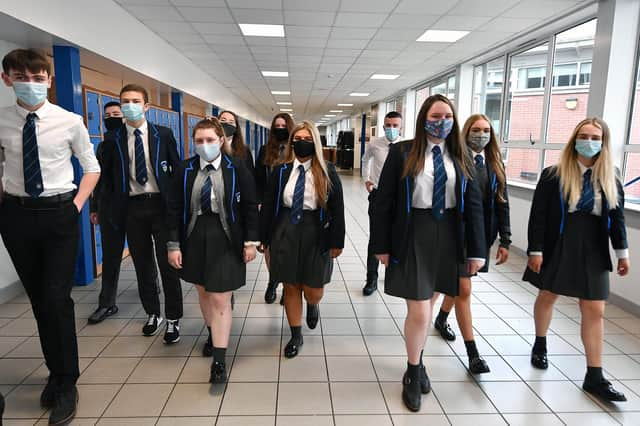Scottish education: We should teach children to be kind but science and maths are important too – Cameron Wyllie


We are hungry for points of light: Biden! A vaccine with a 90 per cent success rate! The new season of The Crown! Press conferences at landscaping companies! And rather tucked away in the papers, news that Scottish pupils have been found to be among the most empathic in the world, in tests carried out by Pisa (the Programme for International Student Assessment).
It’s fair to say that the news from Pisa hasn’t been good for Scotland recently, particularly in maths and science, so any positive news is a blessing, particularly when education has suffered so much in the recent Covid months, but hey, here was something that placed Scottish pupils fourth out of the 27 nations taking part (Canada – and this was no surprise to me – came top. Lovely people.)
Advertisement
Hide AdAdvertisement
Hide AdAs an aside, I did wonder whether a similar international test might be carried out for adults – do we think that older generations in Scotland are similarly engaged, and, if so, how much of this quality in our young people comes from their background?
Anyway, I used to teach a bit of psychology to sixth-year students. It wasn’t a very serious enterprise, being just for 40 minutes a week, and I was very dependent on the popular psychology books I read, and what I had been taught at Moray House College of Education (yes, I know that ages me!) when I did my teacher training there.
More or less a psychopath
One of the books I used was Zero Degrees of Empathy by Simon Baron Cohen (yes, he’s Borat’s brother, a very senior clinical psychologist) and I used to do his empathy test from the book with the young people. It’s a really fascinating exercise, and one in which – though I consider myself to be a kind person who is really interested in other people – I didn’t do all that well myself, coming out only a smidgeon above average.
It was always very interesting to see how the boys and girls did, and not at all predictable. I remember one young man, whom I thought the soul of compassion, who was apparently more or less a psychopath. I would love to tell you what he’s now doing for a living, but that would be very wrong.
Anyway, I think empathy is really important, and I don’t think we should scoff at it; we live in very uncertain times, and as that big CNN newsman Van Jones, said, as he cried live on television following Joe Biden’s victory, "Character matters. Being a good person matters”; arguably, it matters more than anything else.
I always used to say to parents who were thinking about sending their children to the school in which I worked, that the two qualities we valued most were hard work and kindness, and it was true, not least because a kind school is a safe school and a happy school, and in safe, happy schools children can fulfil their potential, academically and in other ways, without fear of being bullied or called by some racial or sexist or homophobic epithet. In other words, they can just get on with what they are essentially in school to do – to learn.
Meaningful societal change
And there’s the rub. I am very happy to accept that Scottish kids do well in judgements of their empathy in part because of the stress that the Scottish curriculum lays on what Larry Flanagan, general secretary of the EIS, referred to as "a broader societal commitment to what might be called the ‘common weal’”.
But how do we balance the need to encourage that societal commitment against the need to ensure that we are sending highly skilled, highly literate young people into further and higher education and into the workforce?
Advertisement
Hide AdAdvertisement
Hide AdBluntly, no matter how emotionally intelligent and kind and tolerant and outward-facing our young people are, in their attitude towards say, immigration, they do need to be able to compete in the world marketplace of technology, science and the arts, and, further, if the Scottish government’s commendable desire to close the poverty-related attainment gap is to happen, it’s going to have to be based on concrete improvement in reading, writing and ’rithmetic (or whatever their modern equivalents are called) if it’s to lead to meaningful “societal” change.
This conundrum is not easily solved. Scotland is in a historical place politically and the way the nation approaches education must be at the heart of the discussion – if we are indeed on the brink of independence, our education system has to be world-class, and we have to begin a major reassessment of it by asking what it is actually possible for us to achieve for all our varied, wonderful, caring children in the course of the 13 years of their lives they spend in schools.
It’s time for there to be a National Conversation on Education, where teachers, parents, educationalists, employers, academics and, most importantly, our young people are asked to think about in what direction our primary and secondary schools should be heading: the question is, how do we have world-class academic and vocational education while retaining the empathy which, it seems, lies in the hearts and minds of our lovely young people?
May that shining quality – of which we should all be proud – never be lost.
Cameron Wyllie’s blog is at www.ahouseinjoppa.wordpress.com
A message from the Editor:
Thank you for reading this article. We're more reliant on your support than ever as the shift in consumer habits brought about by coronavirus impacts our advertisers.
If you haven't already, please consider supporting our trusted, fact-checked journalism by taking out a digital subscription.
Comments
Want to join the conversation? Please or to comment on this article.